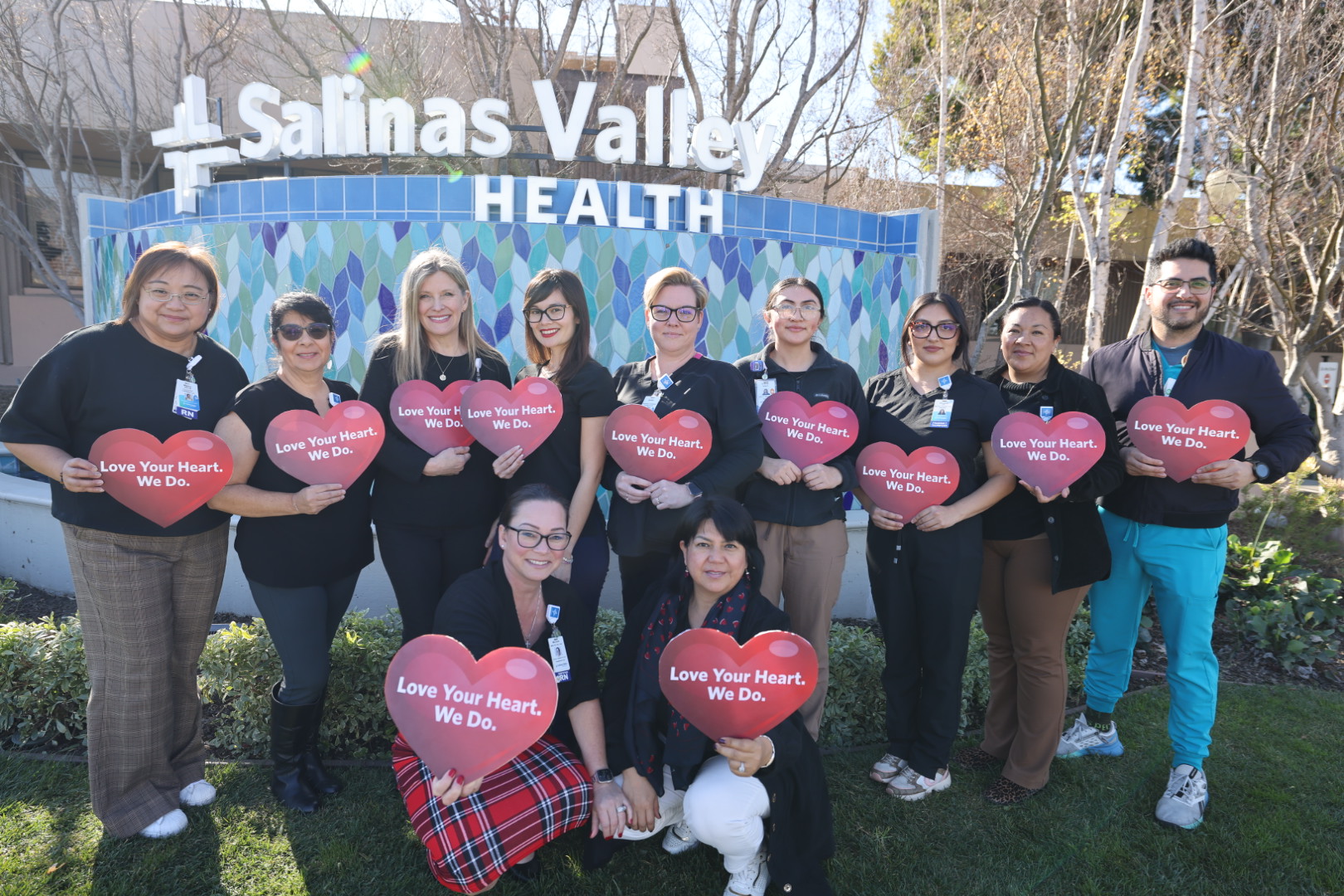wELLNESS RESOURCES
 April 2025 - Living with Diabetes
April 2025 - Living with Diabetes
In 2022, the Community Health Needs Assessment found that diabetes was the most prevalent health issue reported in Monterey County. Whether you are living with Type 1 or Type 2 diabetes, it can be difficult to manage your condition. We are here to provide a few helpful tips on ways to maintain a healthy lifestyle when living with diabetes.
1. Informed diet
Keeping a healthy and balanced diet is crucial when managing your diabetes
and understanding the differences in diet recommendations depends on what
type you have. When you have type 1 diabetes, the goal is to carefully
managing insulin while reducing carbohydrate intake. People with type
2 diabetes, should reduce carbs while trying to improve insulin sensitivity.
This key difference in carbohydrate consumption can help you better understand
how to navigate your diet.
*Did you know? Our Nutrition Services Team at the Salinas Valley Health
Medical Center works with patients to create customized meal plans based
on patients’ dietary and health needs.
2. Stay as active as possible
As note in coverage of other topics on this page, staying active is crucial
in maintaining good overall health. Managing diabetes is another area
where physical activity is a necessity. Be sure to dedicate at least 150
minutes a week to moving your body.
Exercising can often times feel like a chore, especially when life is moving
too fast. Join us for Zumba classes in
Salinas or
Gonzales to get fit while having fun.
3. Manage your stress levels
Much like staying active, stress is another thing that must be controlled
in order to stay healthy, especially when living with diabetes. When you
are stressed, your body goes into fight or flight mode. It will then release
hormones like adrenaline and cortisol which could lead to increased blood
glucose levels if the body cannot process it well. Not only does stress
affect your mental well-being but as someone with diabetes, it could also
have detrimental effects to the body.
If you’re looking for ways to control stress, visit
SalinasValleyHealth.com/mindfulness to see what classes and programs are offered.
4. Understanding the third type of diabetes – gestational diabetes
According to diabetes.org, gestational diabetes occurs in 9% of pregnancies
in the U.S. each year. Gestational diabetes is diabetes that develops
during pregnancy and is limited to pregnancy.
To understand more about gestational diabetes, its effects on a baby and
how it is preventable, see our Ask the Experts Presentation in collaboration
with Stanford Medicine Children’s Health in both
English and
Spanish.
5. Know that you’re not alone
With any disease, one can feel isolated. Living with any type of diabetes is also knowing that many people around you live with it too and are feeling many of the same things you do. Find a community of people who understand you and can offer support.
A great place to find this is at our Diabetes: From Eyes to Exercise and Food to Foot Care class. For more information, visit SalinasValleyHealth.com/pathways.
Upcoming Events

March 2025 - Sleep and its Importance to Health
Sleep is an essential part of our everyday lives. It is our way of resetting after many hours of being awake. It can have a variety of effects on our bodies. Below you will find information provided by Michael Zupancic, MD, of Salinas Valley Health Sleep Medicine, regarding sleep and its impact on our health.
- Adults require 7 hours of sleep, teenagers require 9 and people over the age of 65 often require less sleep, about 6 ½ hours.
- In children, physical growth occurs during sleep as the growth hormone is released during slow-wave sleep.
- Acute sleep deprivation can negatively impact mood, memory and overall well-being. Severe acute sleep deprivation can cause dysfunction of the prefrontal cortex that can contribute to hallucinations and impair attention/coordination.
- Obstructive sleep apnea (OSA) is a common and underdiagnosed condition that occurs more frequently with age. Symptoms of OSA include snoring, gasping/choking/apneic events during sleep, disrupted sleep, morning headaches and daytime fatigue/lack of energy/tiredness.
- People with untreated moderate or severe obstructive sleep apnea have an elevated risk of developing hypertension and stroke.
- The best way for person to improve insomnia is to keep the same wake-up time 7 days a week and spend no more than 8 hours in bed per 24 hours. For difficulty sleeping, Dr. Zupancic recommends a relaxing activity such as listening to music or reading a book and then returning to bed when feeling sleepy.
For more information about Salinas Valley Health Sleep Medicine, visit SalinasValleyHealth.com/sleepmedicine and to see more about Dr. Zupancic, visit Michael J. Zupancic MD | Salinas Valley Health.
Upcoming Events
- Sleep Matters Presentation in Collaboration with the Salinas Public Library
- Marina Farmers' Market Community Health Day
For all our events, visit our
events and classes webpage.

February 2025 - Heart Healthy Tips
1. Fill your plate with heart-healthy food
The food you eat has a direct impact on your heart. Fill your plate with foods high in antioxidants, fiber and proteins to ensure you’re giving your heart the fuel it needs. To find heart-healthy recipes you can start making today, visit our Healthy Cooking page.
2. Take a walk
According to the American Heart Association, walking twenty minutes a day can lower your chance of developing heart disease by thirty percent. Get on track to a healthier you and get that heart pumping! To join our monthly Walk With A Doc events where you can hear about a variety of health topics from our Salinas Valley Health providers while walking with other community members, visit our Walk With A Doc page.
3. Know the difference between a heart attack and a stroke
Understanding whether someone is having a heart attack or a stroke can save a life. See the difference between the symptoms by visiting our Stroke Center page.
4. When in doubt, visit your local cardiologist
Going to see the doctor can be scary, especially for heart-related concerns. Don’t let your fears stop you. To schedule an appointment with one of our cardiologists, visit our Find a Provider page.
5. Stay informed
Learning how to maintain a healthy heart can be challenging. For easy-to-understand information pertaining to the heart, visit our Ask The Experts Podcast page.
Upcoming Events
- Ask the Experts Presentation
- Zumba classes in Salinas and Gonzales
- Look Good Feel Better - Beauty techniques for female cancer patients.
For all our events, visit our events and classes webpage.
 January 2025 - Tips for Starting the New Year Right
January 2025 - Tips for Starting the New Year Right
1. Start a list of goals
How can you know what you want to accomplish in the New Year without having a clear set of goals? Whether it’s on a notepad, whiteboard on your wall or on your phone, be sure to write out your goals. Make sure to follow the SMART Goal method, making sure your goals are Specific, Measurable, Achievable, Relevant and Time-Bound.
2. Create an exercise regimen that works for you
Many people include exercising more as one of their New Year’s resolutions. The key to finding and maintaining a good workout regimen is to set realistic expectations and find what works for you. For some that may be lifting weights five days a week for at least 50 minutes, for others it could be taking a 30-minute walk every other day.
To see the exercise and wellness classes that we offer through our Pathways to Wellness Program, visit SalinasValleyHealth.com/pathwaystowellness.
3. Schedule your annual physical
One way to start the year strong is to schedule your annual physical. To find a provider to schedule your exam with visit Find a Doctor | Salinas Valley Health.
4. Start a new hobby
According to a study conducted by Nature Medicine in 2023, compared with people who didn't have hobbies, those who did reported better health, more happiness, fewer symptoms of depression, and higher life satisfaction. Find something that you enjoy and can use a de-stressor this year. To see additional information about how hobbies can improve health and other aspects of your life, visit Health Benefits of Hobbies. To find something local, visit Blue Zones Project | Get Involved.
5. Don't stress!
It is no secret that stress is not good your overall well-being. While it cannot be completely eliminated, try to leave overstressing in 2024 and practice ways to limit the amount of stress you feel on a daily basis. For ideas on how to reduce stress, visit 13 Unusual Ways to Shed Stress (Lessons from the World’s Blue Zones) - Blue Zones.
